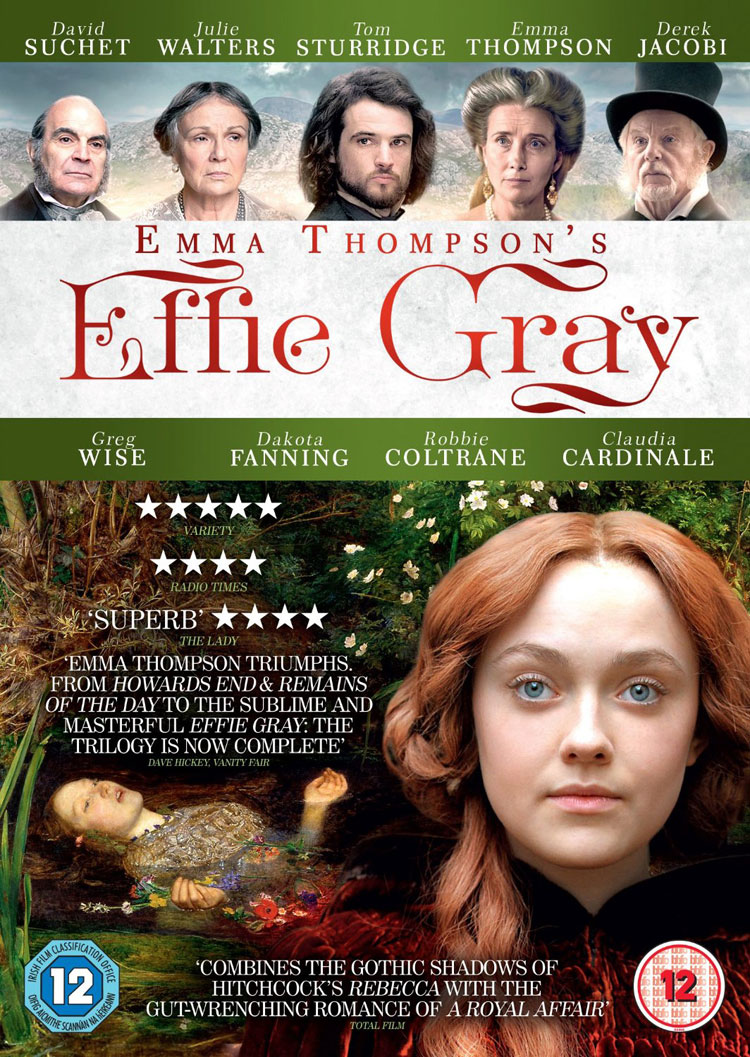
Director: Richard Laxton
Running Time: 108 mins
Certificate: 12
Release Date: February 23rd 2015

Effie Gray is a genuinely fascinating character and one day there will be a brilliant film made about her, but despite vast amounts of effort and some interesting touches, this movie isn’t it.
At 19-years-old Effie (Dakota Fanning) marries the older John Ruskin (Greg Wise), a prominent art critic who’s seen as a very good match. However soon after the wedding problems begin to appear, as while she wishes to be a proper wife, John controlling parents (Julie Walters and David Suchet) prevent her from helping her husband with his domestic affairs, and he himself refuses to consummate their marriage.
Effie understandably begins to feel trapped and suffers from what would probably be today diagnosed as severe depression, something her distant husband has little patience for – taking it as evidence of his increasing conviction that she is wicked. However when they head to Scotland – for her health – they take young artist John Everett Millais (Tom Sturridge) with them, who has been commissioned to paint Ruskin. This lays the seeds for what became one of the Victorian era’s greatest sex scandals, after Effie begins to seek ways to escape and find the passion her life is severely lacking.
Effie Gray had a difficult journey to the screen as even after it was in the can it was delayed due to a lawsuit that challenged Emma Thompson’s script, with another screenwriter making a copyright claim over her screenplays about Effie. Once that was dismissed that path was cleared for it to hit the screen, but unfortunately it’s not half the movie is might have been.
While Thompson has a great way with words, she wants this to be a Victorian Remains Of The Day, where the conflict comes from repressed people whose emotions are held in tightly to the point where they’re about to explode – and therefore even the tiniest show of real connection has great power. However what Remains Of The Day has that this doesn’t is Thompson and Anthony Hopkins giving two of the greatest performances in cinema history. Instead we have Dakota Fanning who seems less repressed and more totally blank. Greg Wise starts off seeming perpetually perplexed before getting a bit moustache-twirly, but it’s very difficult to discern what’s happening under his surface.
There’s plenty of promise in Tom Sturridge’s Millais, but he doesn’t appear properly until after the halfway point, giving the movie little time to build any passion between him and Effie – indeed we see so little that when she eventually starts to think about leaving Ruskin for him, it seems more foolhardy than a call to passion. Richard Laxton’s direction doesn’t help either as it’s so contained it always feels like you’re outside looking in rather than being brought into their world.
It doesn’t help either than in its desire not to stray too far from the historical record, it feels like we’re only getting part of the story. The most famous story about Effie is probably apocryphal – that her husband never slept with her because he was horrified by the sight of her pubic hair, having only seen female nudes in art – but it’s a better explanation than the movie gives. There are hints about why he won’t touch her, such as the possibility of him being asexual, gay, interested in younger girls or completely oedipally screwed up with a massive Madonna/whore complex. However it’s all hints, so at the end of the movie the real reason could be absolutely anything.
Although some people criticise films when they don’t 100% stick to the known historical facts, that would be better than this.
There’s a lot of promise here and it’s a massive shame the film doesn’t really get to grips with Effie’s story – she is an incredible figure, but we will have to wait for a movie that does her justice.
Overall Verdict: With a stronger hand at the till and actors who could better portray the turmoil under the surface of seemingly still waters this could have been great, but unfortunately it’s not just Ruskin who’s accused of impotency, it’s the film itself.
Reviewer: Tim Isaac





Leave a Reply (if comment does not appear immediately, it may have been held for moderation)